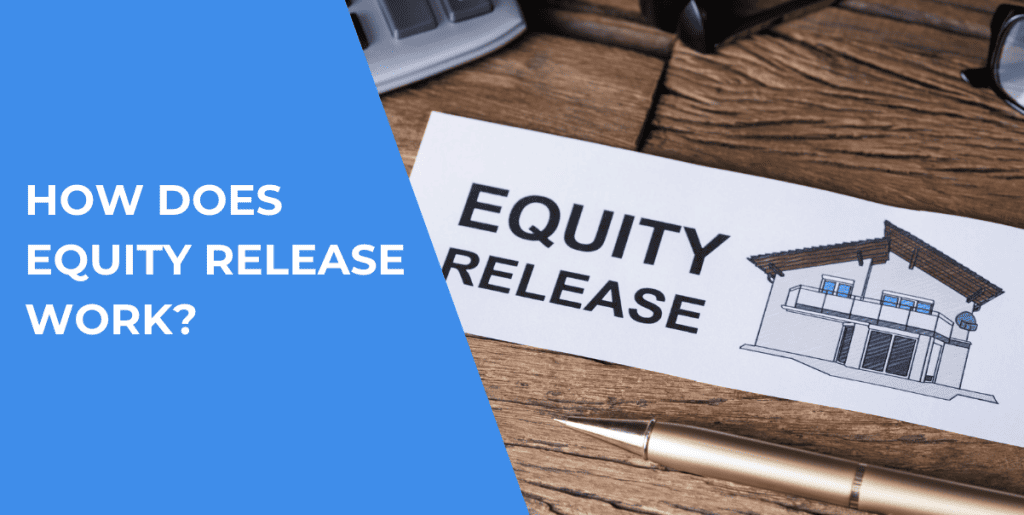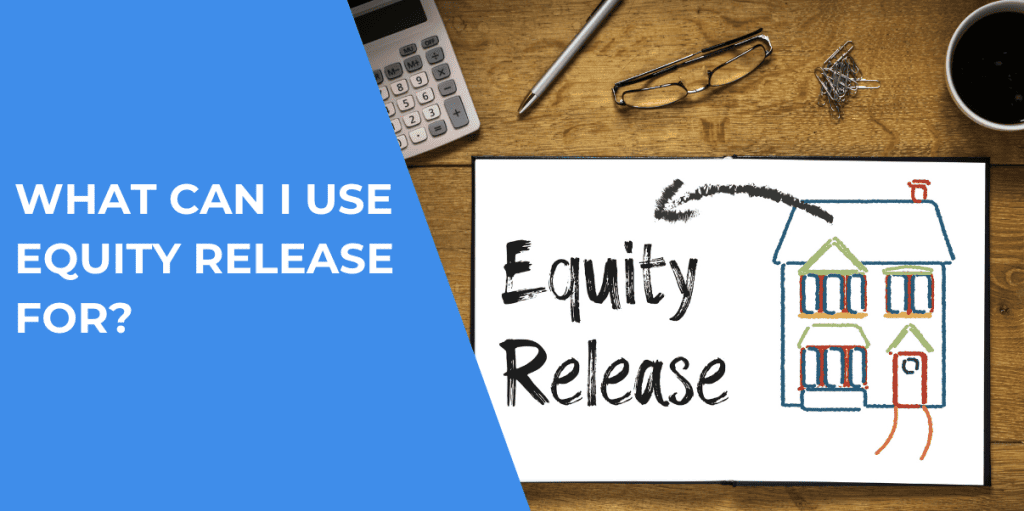Equity release can be defined as the process of letting you ‘release tax-free cash from the value of your home’ as long as you’re above the age of 55. This can be a great way to access some of the money you have tied up in your home. But how does equity release actually work? In this blog, we’ll be exploring the ins and outs of how equity release works, so you can make an informed decision if this is the right solution for you.
What Is Equity Release?
Let’s take a more in-depth look at what equity release is.
Equity release is a way of gaining access to the money that has been locked up in the value of your home through a lifetime mortgage or a home reversion plan. This allows you to access your money without having to move out of your home or downsize. In addition, it is a useful way to help supplement your pension income during retirement.
The amount you can release will depend on two main factors: the value of your home and your age. As a rule of thumb, the older you are and the more valuable your home is, the more money you’ll be able to access. It’ll be up to you whether you’d like this money as a lump sum, a pre-approved drawdown facility or a regular income of smaller payments.
We recommend checking out our equity release calculator.

How Does Equity Release Work?
If you’re considering equity release as a long-term option, it is essential to understand how the process works and to get advice from a financial adviser.
The first step is to contact a professional who can give you more information on the different types of equity release available. They’ll look at your individual circumstances to make sure that equity release is right for you and that it meets your needs. They’ll help you explore other avenues to obtain the money you require too.
Once a suitable option has been agreed your adviser will go through all the relevant paperwork with you. They’ll detail who the equity release provider is, what the costs are, the implications involved alongside any additional features. Once you have taken a bit of time to digest this and talk to your family about it your adviser can submit the application. They’ll keep you updated on the progress and arrange to get an accurate valuation of your home. Once the lender or provider has agreed they’ll then send out paperwork that you’ll need to complete and sign before the application can progress any further. There are a few legalities that then need to take place, which you may need to take independent legal advice.
Once this has been completed, you can access the money at any time!
Of course, there are a few things you need to bear in mind before making any decisions, such as how long it takes for the money to be released and what fees and interest may apply. It is important do your research so that you make an informed decision on whether a release is right for you.
Equity Release Options
When it comes to equity release, there are two main options to consider:
Lifetime Mortgage
A Lifetime Mortgage is a loan secured against your property, allowing you to release money from the value of your home without having to move out or give up ownership. The lifetime mortgage will be repaid with interest when the last surviving homeowner dies or moves into long-term care. There are options where you can pay voluntary payments to keep the balance static or even reduce it.
Home Reversion
Home reversion is an alternative to lifetime mortgages. This type of equity release involves selling part or all of your property in exchange for a lump sum, or regular payments. With home reversion plans, you still keep the right to live in the property rent-free until you die or move into long-term care.

What Can I Use Equity Release For?
The possibilities are endless when it comes to an equity-release mortgage. Whether you’re looking to fund a dream holiday, make home improvements, help the kids with a deposit or their university fees or to just have some extra money in your pocket for rainy days – equity release could be the answer. It can also provide you with peace of mind knowing that you’ve got access to extra funds if you ever need them.
Equity Release Interest Rates
When it comes to equity release, interest rates are an important part of the equation. The interest rates will determine how much your loan costs each month or year. As with any financial product, it is best to shop around for the best option, but lifetime mortgages traditionally offer higher interest rates of around 4-8%, but this figure will vary from one provider to another.
Is Equity Release Safe?
Equity release is a safe option for those looking to unlock cash from their home. It doesn’t require you to make any monthly repayments, and the amount of money you owe can never exceed the value of your property. This is just one of the reasons why equity release is such a popular option among people over the age of 55 who want to get access to the money saved up in their homes.
When opting in for a scheme, you should ensure that your lender is a member of the Equity Release Council. This is a body of lenders who agree to abide by a set of standards and regulations that ensure those taking out equity release are treated fairly. They’ll have certain protections in place, including the ability to make voluntary payments, downsizing protection and a no negative equity guarantee.
That’s why at Jones and Young, we only work with lenders who are members of the Equity Release Council. We understand that lifetime mortgages and equity release are huge decisions for many people, so it’s important to get independent advice from an experienced professional who can explain all your options and help you decide whether this is right for you. We’ll also explain how releasing a tax-free lump sum can affect means-tested benefits so that any other income streams won’t be affected.

The Benefits of Equity Release
Now we’ve explored a bit more about what equity release is and how it is safe, let’s look at some of the benefits that come with it:
1. Access To Money Saved In Your Home
Equity release schemes allow you to access the money saved up in your home without selling or moving out. Allowing you to use these funds for whatever you wish, such as making home improvements, going on holiday or to have a little extra money coming in during your retirement.
2. Flexible Repayment Options
The various different types of equity release also come with flexible repayment options, such as making voluntary payments towards your loan or even paying it off entirely if you wish. This is a major difference between equity release and traditional mortgages, as you cannot make voluntary payments with an existing mortgage.
3. Flexibility
You can choose the amount of money you take out and when. This allows you to control your finances and ensures that you only borrow what is necessary for you. If you find yourself in a position where you can afford to pay the loan off, then you are free to do so.
4. Tax-free Lump Sum
Any money taken out as part of an equity release plan is tax-free and can be used for whatever you wish. This can be a great way to help improve your finances and fund any major life events.
Things You Should Consider Before Releasing Equity
Here are the top 5 factors you should take into consideration before choosing to release equity from your home:
1. Means Tested Benefit Implications –Releasing money from your home can impact any means tested benefits you currently receive and it is important to understand the potential implications of this before proceeding with an application.
2. Payment Options – Consider the various payment options available when you decide to take out an equity release, as the equity release cost may vary between providers.
3. Early Repayment Charges – You should understand the terms and conditions of your equity release product, including any early repayment charges you may incur if you pay back your loan earlier than expected.
4. Interest Rates – Make sure to compare the interest rates of different lenders before making a decision, as this will have an effect on the total cost of your equity release or lifetime mortgage.
5. Impact on Inheritance – Equity release can impact the inheritance you leave for your family and loved ones, so it’s important to consider this when deciding whether or not to take out a loan.
If you are considering equity release for your property, we’d recommend seeking equity release advice or consulting with a professional equity release adviser. This is the best way to make sure that you are making the right decision for you and your family.

What Are The Alternatives To Equity Release?
If you’re not fully convinced that equity release loan is your best option and want to consider alternative options, here are a few:
Moving Home
This could be a viable option if you are able to downsize and invest the proceeds of your current property into something smaller. This could free up capital that can be used in addition to your pension income or as a deposit on another home.
Return To Work
If you have access to a part-time job and there is an opportunity for flexible working, this could also provide you with the additional funds needed to supplement your income.
Take Out A Home Improvement Loan
If you are looking to renovate your current home, rather than move house, a home improvement loan could be the ideal option. This type of loan is usually unsecured and can be repaid over a period of time in fixed monthly instalments.
Equity Release Advice
Here at Jones and Young, we’re specialist mortgage brokers who can advise you on whether or not equity release and later-life mortgages are the right options for you. An equity release product can offer a variety of financial benefits, but the decision should not be taken lightly. That’s why we’re here to provide you with all the information and advice you need to make an informed decision.
Whether it’s learning more about how equity release products work or understanding your options, our team will be there every step of the way. Our experts have years of industry experience and will be able to guide you through the process and answer any questions you may have. No question is too big or too small. So, if you’re considering equity release, get in touch with us today to see how we can help!
We hope that this guide has given you more insight into Equity Release and how it works. Our experienced team is on hand to answer any further questions you may have. We look forward to hearing from you soon!
Equity Release FAQs:
We’ve answered some of the most frequently asked questions about equity release below:
What Is The Downside To Equity Release?
The downsides to equity release include reducing any inheritance you may leave behind, early repayment charges and potentially losing eligibility for means-tested benefits. It is important to consider all the options available before deciding whether equity release is right for you.
What Does Martin Lewis Think Of Equity Release?
Martin Lewis, the UK’s leading money expert, believes that equity release is a “big financial decision”. However, it can be a good way to access money tied up in your home to enjoy a more comfortable retirement.
Is Equity Release A Good Idea?
This question has no specific answer, as it depends on your circumstances. Equity release can be a suitable option for people with no other way of accessing the money tied up in their homes; however, you should always weigh the potential risks of taking out an equity release plan against any potential benefits. It is best to speak to a financial advisor before making any decisions.
How Does Equity Release Work?
Equity release allows you to access the money tied up in your home. The money you can borrow is based on your age and the value of your home. This can be done through either a home reversion scheme or a lifetime mortgage, depending on your individual circumstances.






